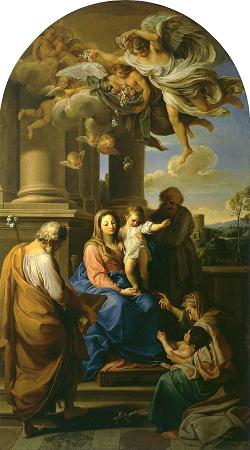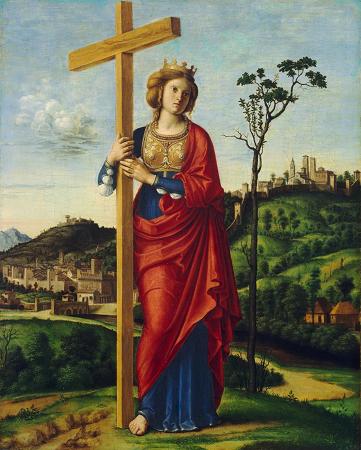Saint Zacharias. Zechariah is a figure in the New Testament Bible and the Quran, hence venerated in Christianity and Islam. In the Bible, he is the father of John the Baptist, a priest of the sons of Aaron in the Gospel of Luke, and the husband of Elizabeth who is a relative of the Virgin Mary. According to the Gospel of Luke, during the reign of king Herod, there was a priest named Zechariah, of the course of Abia, whose wife Elizabeth was also of the priestly family of Aaron. The evangelist states that both the parents were righteous before God, since they were blameless in observing the commandments and ordinances of the Lord. When the events related in Luke began, their marriage was still childless, because Elizabeth was barren, and they were both well advanced in years. The duties at the temple in Jerusalem alternated between each of the family lines that had descended from those appointed by king David. Luke states that during the week when it was the duty of Zechariah's family line to serve at the temple of the Lord, the lot for performing the incense offering had fallen to Zechariah. The Gospel of Luke states that while Zechariah ministered at the altar of incense, an angel of the Lord appeared and announced to him that his wife would give birth to a son, whom he was to name John, and that this son would be the forerunner of the Lord. Citing their advanced age, Zechariah asked with disbelief for a sign whereby he would know the truth of this prophecy. In reply, the angel identified himself as Gabriel, sent especially by God to make this announcement, and added that because of Zechariah's doubt he would be struck dumb and not able to speak, until the day that these things shall be performed. Consequently, when he went out to the waiting worshippers in the temple's outer courts, he was unable to speak the customary blessing. After returning to his house in Hebron, in the hill country of Judah, his wife Elizabeth conceived. After Elizabeth completed her fifth month of pregnancy, her relative Mary was visited by the same angel, Gabriel, overshadowed by the Holy Ghost and-though still a virgin-became pregnant with Jesus. Mary then travelled to visit her relative Elizabeth, having been told by the angel that Elizabeth was in her sixth month of pregnancy. Mary remained about three months before she returned to her own house. Elizabeth gave birth, and on the eighth day, when their son was to be circumcised according to the commandment, her neighbours and relatives assumed that he was to be named after his father. Elizabeth, however, insisted that his name was to be John; so the family then questioned her husband. As soon as Zechariah had written on a writing table: His name is John, he regained the power of speech, and blessed the Lord God of Israel with a prophecy known as the Benedictus or Song of Zechariah. The child grew up and waxed strong in spirit, but remained in the deserts of Judea until he assumed the ministry that was to earn him the name John the Baptist. Origen suggested that the Zechariah mentioned in Matthew 23:35 as having been killed between the temple and the altar may be the father of John the Baptist. Orthodox Christian tradition recounts that, at the time of the massacre of the Innocents, when King Herod ordered the slaughter of all males under the age of two in an attempt to prevent the prophesied Messiah from coming to Israel, Zechariah refused to divulge the whereabouts of his son, and he was therefore murdered by Herod's soldiers. This is also recorded in the Infancy Gospel of James, an apocryphal work from the 2nd century. The Roman Catholic Church commemorates him as a saint, along with Elizabeth, on September 23. He is also venerated as a prophet in the Calendar of Saints of the Lutheran Church on September 5. The Eastern Orthodox Church also celebrates the feast day of Zechariah on September 5, together with Elizabeth, who is considered a matriarch. Zechariah and Elizabeth are invoked in several prayers during the Orthodox Mystery of Crowning, as the priest blesses the newly married couple, saying Thou who didst. accept Zechariah and Elizabeth, and didst make their offspring the Forerunner. and .bless them, O Lord our God, as Thou didst Zechariah and Elizabeth. In the Greek Orthodox calendar, Zechariah and Elizabeth are also commemorated on June 24. Armenians believe that the Gandzasar Monastery in Nagorno Karabakh, Azerbaijan contains relics of Zechariah.
more...





